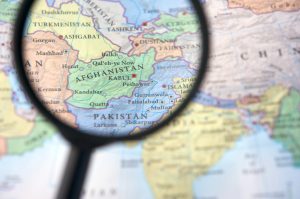In 2018, the Central Asian states launched a mechanism of consultative meetings, which marked the beginning of a new wave of regional integration. Today, the issue of security remains a key aspect of intra-regional cooperation.
Given the current geopolitical tensions in the world, accompanied by growing violence and conflicts of varying intensity, it is vital for the Central Asian countries to maintain stability in the region, effectively countering modern challenges and threats. In order to consolidate efforts in this direction, at the fourth Consultative Meeting of the Heads of State of Central Asia in Cholpon-Ata, Kyrgyzstan in 2022, it was proposed to establish a regular dialogue between the secretaries of the security councils of the five republics, as well as to strengthen cooperation between the military departments. The first meeting of the heads of the security councils took place in May 2024 in the capital of Kazakhstan.
Among the common security threats that regional actors seek to combat together are international extremism, terrorism, drug trafficking, and the illegal arms trade. However, there is another factor that causes extreme concern for Central Asian countries: the situation in Afghanistan, which directly affects security and stability in Central Asia.
Today, Uzbekistan pursues a pragmatic policy toward Afghanistan, based on the principles of close friendship and good neighborliness. But this has not always been the case. Until 2017, Tashkent tried to distance itself from its southern neighbor, considering it a source of threats to national and regional security. Nevertheless diplomatic, economic and cultural-humanitarian ties between the countries did not cease.
After the Taliban came to power, Uzbekistan was the first country to enter into an open dialogue with the new – and as yet unrecognized – government of Afghanistan. This approach allowed Uzbekistan to maintain and even strengthen the dynamics of bilateral cooperation. The past few years have been marked by a rapid growth in mutual trade; by the end of 2023, trade volume exceeded $860 million. Joint infrastructure projects are being implemented, including the construction of the Mazar-i-Sharif–Kabul–Peshawar railway, which will provide access to Pakistani ports in the Indian Ocean. Tashkent and Kabul are actively developing investment partnerships in such important sectors as mining, energy, and agriculture.
Today, the leadership of Uzbekistan perceives Afghanistan as a country of opportunity, emphasizes its belonging to Central Asia, and advocates for the deep integration of Afghanistan into regional economic processes.
Uzbekistan consistently places the Afghan issue on the agenda of major international events, such as sessions of the United Nations General Assembly, consultative meetings of Central Asian heads of state, and summits of the Shanghai Cooperation Organization, the Organization of Turkic States, and other regional associations. Tashkent has called on the international community, as well as political and financial institutions not to isolate Afghanistan. Uzbekistan’s main focus is on providing widespread humanitarian aid to the Afghan people, as well as combating terrorist activity.
To this end, Uzbekistan has made a series of proposals through the years: establishing a permanent U.N. commission on Afghanistan, creating a special Humanitarian Support Fund for Afghanistan, establishing an International Transport and Logistics Hub in the border city of Termez to provide humanitarian aid to the Afghan people, unfreezing Afghan assets in foreign banks and using them to solve social problems in Afghanistan, creating a Contact Group at the level of special representatives of Central Asian countries for Afghanistan, and resuming the work of the Shanghai Cooperation Organization-Afghanistan Contact Group. Tashkent also advocates maintaining a dialogue with Kabul on border security, water use, and trade development.
Uzbekistan’s proactive actions on the Afghan track are having a multiplier effect, encouraging more and more countries to view Afghanistan – once exclusively seen through the lens of conflict – in a positive light. This provides the basis for developing a common, coordinated approach to Afghanistan, something that official Tashkent tirelessly calls on its close neighbors and other foreign partners to do.
Yet Afghanistan continues to be a safe haven for radical Islamist groups. After the withdrawal of NATO troops from Afghanistan, the number of al-Qaida and regional Islamic State fighters in the country has doubled. There has also been an increase in terrorist activity in Afghanistan, partly due to the plight of the Afghan people. According to the U.N. Development Program, around 85 percent of Afghanistan’s population lives below the poverty line.
All of this, of course, is a serious concern for the Central Asian countries, which are deeply aware of the need for consolidation to resolve the Afghan issue. In this regard, it seems relevant to develop and adopt a regional strategy for Afghanistan, taking into account the national interests of all Central Asian republics.
It is advisable to establish cooperation between the security and defense departments, to unite the military personnel and military-technical potential of the Central Asian states for the prompt identification and repulsion of external threats to regional security. It is also necessary to consolidate the efforts of the Central Asia special services with the involvement of the Afghan side to conduct counter-terrorism operations and identify “sleeper cells” of terrorist groups based in Afghanistan.
An important aspect of ensuring regional security is the availability of Central Asian countries’ own collective rapid response forces in case of crisis situations of varying intensity. The region has successful experience in that regard. In the summer of 1997, an agreement was signed between Kazakhstan, Kyrgyzstan, and Uzbekistan on the creation of the Central Asian Peacekeeping Battalion (CENTRASBAT) under the auspices of the United Nations. The document stated that, by agreement, CENTRASBAT units could be sent and deployed on the territory of one of the parties. The battalion was dissolved in 1999.
In the current conditions of increased risks to regional security, it seems possible to follow the CENTRASBAT model. This will allow the Central Asian states to independently prevent external and internal threats to regional stability, without the participation of external players.

































